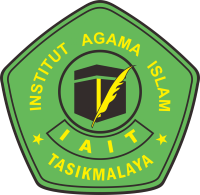The Influence of the Ability to Read the Quran on Arabic Language Learning Outcomes at Madrasah Tsanawiyah Asy Syifa Balikpapan
DOI:
https://doi.org/10.61166/kasyafa.v2i3.8Keywords:
Ability to Read the Qur'an, Arabic Learning Results, Tsanawiyah Madrasah, Integrative Learning, Linear Regression AnalysisAbstract
This study is designed to examine the impact of the ability to read the Qur'an on the achievement of learning Arabic at Madrasah Tsanawiyah Asy Syifa Balikpapan. With a cooperative quantitative approach, a population of 200 students was studied and 35 students were randomly selected as samples. To collect data, this study used a questionnaire consisting of ten questions using the Likert Scale. Data analysis was carried out by applying reliability tests directly through SPSS 25. The R Square value obtained at 0.590 indicates that there is a significant correlation between the ability to read the Qur'an and the achievement of learning Arabic. This means that the ability to read the Qur'an contributes by 59% to the variation of Arabic learning outcomes. Furthermore, a reliability coefficient of 0.785 indicates that every 1% increase in Qur'anic reading ability will increase Arabic learning achievement by 0.785. In conclusion, the ability to read the Qur'an has a positive impact on Arabic learning outcomes, so it is very important to integrate the teaching of reading the Qur'an into the Arabic curriculum in madrassas to improve student achievement.
References
Arsyad, dan Salahudin. “Hubungan Kemampuan Membaca Al-Qur’an dan Minat Belajar Siswa dengan Hasil Belajar Pendidikan Agama Islam (PAI).” Edukasi: Jurnal Pendidikan Agama dan Keagamaan, Vol. 16, No. 2, Agustus 2018, 181.
Departemen Agama RI. Metode-Metode Membaca Al-Qur’an di Sekolah Umum. Jakarta: Direktorat Jenderal Pembinaan Kelembagaan Agama Islam, 1998.
Departemen Pendidikan Nasional. Kamus Besar Bahasa Indonesia. Jakarta: Balai Pustaka, 2005.
Dinyanti, dan Mudjiono. Belajar dan Pembelajaran. Jakarta: Rineka Cipta, 2013.
Hamalik, Oemar. Kurikulum dan Pembelajaran. Jakarta: Bumi Aksara, 1999.
Kussrinaryanto. “Korelasi Tahfizh Alquran dengan Prestasi Belajar Bahasa Arab Santri di Pondok Pesantren Penghafal Alquran Daarul Qur’an Semester Gasal Sanggir Paulan Colomadu Karanganyar Tahun Ajaran 2013/2014.”
Maknun, Moch Luklil. "Buku Bahasa Arab MI di Pekalongan." Jurnal Penelitian, Vol. 11, Mei 2014.
Nurbaya, S., Said, N., & Mansyur, L. M. (2023). Pengaruh kemampuan membaca al quran terhadap prestasi belajar Bahasa arab siswa mts darussalimin nw sengkol mantang. ANNABA’ | Jurnal Pemikiran Pendidikan Islam, Pembelajaran dan Pengajaran, 2(1), 59–69.
Sudjana, Nana. Dasar-Dasar Proses Belajar Mengajar. Bandung: Sinar Baru Algensindo, 2014.
Sudjana, Nana. Dasar-Dasar Proses Belajar Mengajar. Bandung: Sinar Baru Algensindo, 2014.
Sudjana, Nana. Penilaian Hasil Proses Belajar Mengajar. Bandung: Remaja Rosdakarya, 1990.
Sugiyono. Metode Penelitian Kualitatif, Kuantitatif dan R&D. Bandung: Alfabeta, 2018.
Syah, Muhibbin. Psikologi Belajar. Jakarta: Rajawali Press, 2015.
Tarigan, Jago. Tehnik Pengajaran Ketrampilan Berbahasa. Bandung: Angkasa, 1984.
Umar, H. Metode Penelitian untuk Skripsi dan Tesis Bisnis. Jakarta: Rajawali Pers, 2008.
Widoyoko, Eko Putro. Penilaian Hasil Pembelajaran di Sekolah. Yogyakarta: Pustaka Pelajar, 2014.
Downloads
Published
How to Cite
Issue
Section
License
Copyright (c) 2025 Dimas Ramadhan, Iskandar Yusuf

This work is licensed under a Creative Commons Attribution 4.0 International License.












